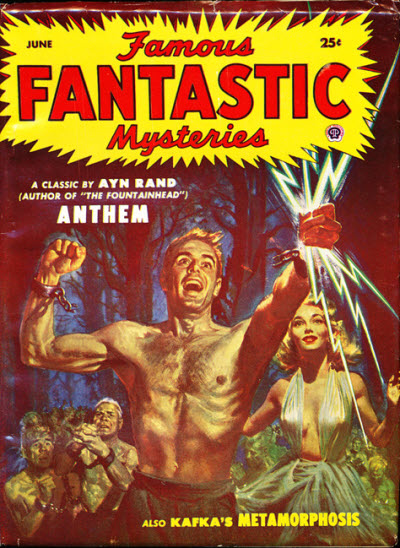
President Trump has said that his favourite book is Ayn Rand’s 1943 novel The Fountainhead and that Rand is his favourite author. Its protagonist is a young architect called Roark who designs modernist buildings and refuses to toe the line with the architectural establishment.
Roark’s struggle reflects Rand’s philosophy of ‘objectivism’ – the belief that, as she put it, ‘man exists for his own sake, that the pursuit of his own happiness is highest moral purpose, and that he must not sacrifice himself to others, nor sacrifice others to himself.’
Popular culture
Rand is the darling of right-wing politicians from Alan Greenspan to Sajid Javid. But traditionally, left leaning thinkers, especially those concerned with literature and philosophy, have tended to ignore her. If her work is referenced, it is often in terms of its irrelevance. Her novels especially are often understood to be unreadable: silly; over-long; politically irredeemable.
But this tactic of avoidance comes at a cost. Topping Amazon sales charts, endorsed by the most powerful politicians in America, deified by the Alt-Right, and even recently legitimised by weighty academic publishers such as Oxford University Press, Rand has emerged as a major force within contemporary culture. So far this force has met with little organised resistance.
Left-wing resistance
Our conference, on November 13, will mark the first attempt to offer a sustained academic critique of Rand’s literature and philosophy. The conference will include group discussions and lectures by academics with an interest in Rand. It aims to take Rand seriously, even as it resists her ideas. It will, however, also ask what a study of Rand might contribute to wider contemporary debates within literature theory and philosophy.
For example, to what extent might a study of Rand help us frame and think through constructions of: genre; sexuality; nationhood; originality; the popular; austerity; individualism; freedom?
Hiding in plain sight
As Associate Professor of English Literature, Rand interests me for three essential reasons. The first is the seeming triviality or obviousness of her work. My own research interests centre on close reading discourses that appear to be self-evident, drawing out the difficulties that are often overlooked in apparently simple texts.
Dr Krissie West, author of two books on American literature forthcoming in 2019, and previously Reading postgraduate student, shares this approach. She will be teasing out subtle differences in the language of ‘individualism’ within the work of Rand and the great 19th Century American writer Emerson.
Rand’s work also offers the opportunity to work through challenging issues of sexuality and gender, and to engage with theories of the visual, which I will address in my lecture on Rand and art theory.
We are very fortunate to have contributions from current students in the department of English literature. Jerome Cox-Strong, a student on the MA in English and winner of last year’s Dr Jean Young Memorial Award will be talking about Rand’s view of the contemporary left.
External speakers
From beyond Reading, psychoanalyst Professor Ian Parker will be talking about the relation between libertarianism, psychoanalysis and Rand. Cultural theorist and highly-regarded author Dr Jan de Vos from Ghent University, will be talking on Rand and Silicon Valley and ‘psychologisation’.
Finally, Carl Packman, economist, regular commentator for Sky, The Spectator and The Guardian and author of two recent books for Palgrave on debt, will be explaining the difficulties that emerge when Rand’s economic ideas are put into practice.
